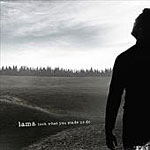Home » Jazz Articles » Extended Analysis » David S. Ware: David S. Ware Quartet: Live in Vilnius
David S. Ware: David S. Ware Quartet: Live in Vilnius
 David S. Ware
David S. Ware Live in Vilnius
No Business
2009
The year 2009 could be a rather big year for tenor saxophonist and improvising composer David S. Ware, and that's saying a lot. After all, Ware has long been one of the most celebrated figures in free jazz, owing not only to his work with artists like pianist Cecil Taylor and percussionists Andrew Cyrille and Beaver Harris, but also his longstanding quartet, which was founded in 1989 with pianist Matthew Shipp, bassist William Parker and percussionist Marc Edwards. Through drummer and label changes, Ware's quartet did imbue the avant-garde with an almost populist sensibility, a sonic imprint that was respected through numerous festival appearances and a short-lived contract with Columbia Records, where Ware's playing and the cohesiveness of his group had impressed A&R man Branford Marsalis.
Following 2007's Renunciation (AUM Fidelity), Ware disbanded the unit. Health issues have prevented him from working until recently, and his new guitar-driven ensemble rethinks the paradigm set by previous instrumentation. But a conscious commitment to the interaction of piano, bass and drums is something still to be respected, and on the 20th anniversary year of the Ware quartet's (DSWQ) formation, Lithuania's No Business Records has released the group's final concert. Live in Vilnius features the "classic group" extant from 1999-2007, with Guillermo E. Brown on drums, across six compositions and four vinyl sides. Surprisingly, it's only the second live document of the group to appear, following Live in the World (2005), a three-disc set on Thirsty Ear.
It's not difficult to hear, from the introductory bars of "Ganesh Sound," which takes up the first side, what makes the quartet's music accessible. Though by no means traditional, a combination of ecstasy, weight and repetition conspire towards a dynamic veneration. A droning rubato segment for piano, bowed bass and rattling bells appears massive and impregnable at the outset, something akin to the alaps favored in mid-period John Coltrane, but with a decidedly sinister edge. Ware enters with a flinty church-like phrase, more Sonny Rollins than Albert Ayler, breathy and teasing as Shipp, Parker and Brown settle into a lopsided, free-time gospel push underneath. There is an interesting tension that exists between Ware's hard-bitten reed and the romantic and slightly minimalist chord voicings Shipp utilizes. Triple-stopped masses of steel strings and Brown's tom-heavy attack knit a tight web underneath the pair, but the poles remain in a constant play of readjustment between consonance and dissonance, clusters and light resolution. Even as the tenor improvisation approaches pure evisceration, there's a rounding of the edges, and once the rhythm section have their say, it's toward delicate bricks of crystalline repetition. A dusting of bamboo sticks and worrying upper-register arco skirt the tune before its restive close.
A flitting a capella tenor section opens the florid anthem "Theme of Ages," ringing minor chords a launching pad for condensed screams. It's the sort of approach to the saxophone that, prior to the 1965 Coltrane quartet, might have seemed an improbable match for any pianist. Pianists like McCoy Tyner, Bobby Few and Dave Burrell, however, formed bedrocks from the superimposition of scales, allowing the reed player a vast amount of chordally valid approaches. Coltrane, Pharoah Sanders and Frank Wright are among the saxophonists whose bands made great use of this approach, and it has found traction in the Shipp-Ware juggernaut, allowing the unabashedly "out" to feel structured and "in." The funky "Mikuro's Blues" closes the second side, a theme that also appears on Renunciation, and which is very much out of the rock-solid school of cluster-anthems employed by pianist Mal Waldron's 1970s trios.
The centerpiece of Live in Vilnius is a 26-minute exploration of Sun Ra's "Theme of the Stargazers," which takes up one and one-third sides of the set. Though as a leader and writer, standards and covers don't frequently make their way into the Ware songbook, special compositions like Rollins's "Freedom Suite" have occupied a notable spot. "Stargazers" finds Shipp rustling in the piano's guts, a black-coated sun harp outlined with Parker's pirouetting bow. The pianist approximates Ra's clunky progression in sketch only at first, the trio soon assembling a beautifully ringing groove that, while the original's whimsy is absent, nevertheless floats and sashays around Parker's firm-but-pliant anchor. Ware's hangs back for the first several minutes; rather than state the theme his solo quickly builds into panned, earth-rattling long tones, a throaty and deep foghorn that cuts through everything around it. As a device, it seems purely for air-clearing effect; he's more interesting as he bounces, pops and winds around his compatriots, for Ware is a truly acrobatic player. A clipped piano statement and interlude for pizzicato bass and toms follow, Ware re-entering with cottony digs and squirrely circular runs over skating rhythmic push-pull.
As with much of the DSWQ catalog, it's obvious that the "Q" stands for something cooperative. In an age where all-star lineups, unique projects and sideman gigs are extraordinarily common, it's refreshing (if not downright jaw-dropping) to see a band that lasted nearly twenty years playing this music. Live in Vilnius is a fitting document to close out their run, and while not any more or less a jewel than the other 17 releases, it's an excellent final chapter. As a reminder of what came before, it will also be an interesting companion to Ware's future projects.
Tracks and Personnel
Tracks: Ganesh Sound; Theme of Ages; Mikuro's Blues; The Stargazers; Lithuanian Whirl; Surrendered.
Personnel: David S. Ware: tenor saxophone; Matthew Shipp: piano; William Parker: bass; Guillermo E. Brown: drums.
Personnel
David S. Ware
saxophone, tenorAlbum information
Title: David S. Ware Quartet: Live in Vilnius | Year Released: 2009 | Record Label: Unknown label
Tags
PREVIOUS / NEXT
Support All About Jazz
 All About Jazz has been a pillar of jazz since 1995, championing it as an art form and, more importantly, supporting the musicians who make it. Our enduring commitment has made "AAJ" one of the most culturally important websites of its kind, read by hundreds of thousands of fans, musicians and industry figures every month.
All About Jazz has been a pillar of jazz since 1995, championing it as an art form and, more importantly, supporting the musicians who make it. Our enduring commitment has made "AAJ" one of the most culturally important websites of its kind, read by hundreds of thousands of fans, musicians and industry figures every month.





















